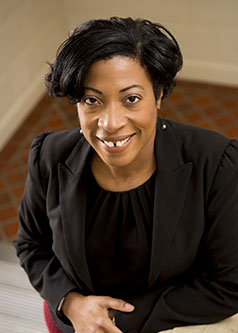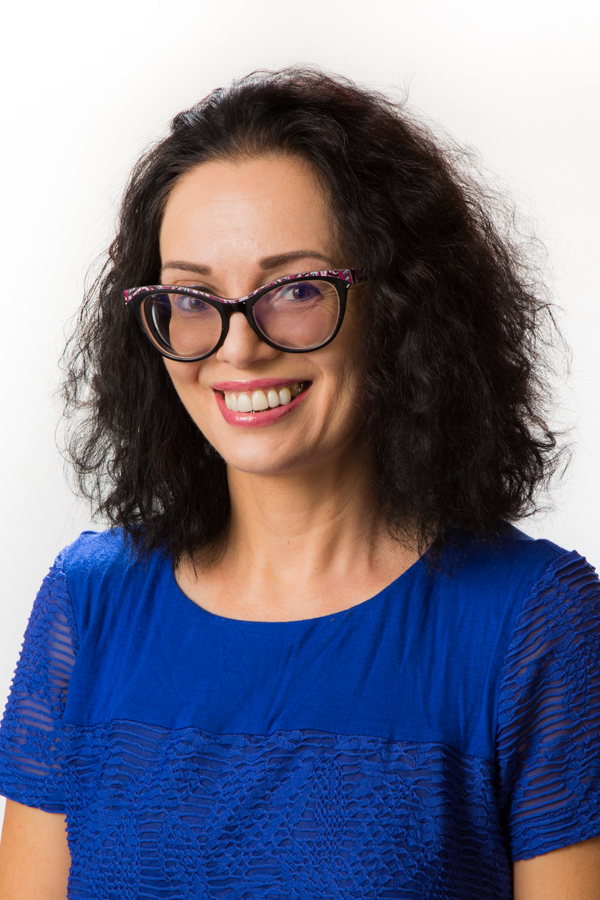Research Spotlight on Women Faculty: Raegan Higgins & Miglena Sternadori
March 4, 2020 |
During March, Texas Tech is celebrating women faculty who exemplify excellence in research, scholarship, creative activity, teaching, and mentoring.
Raegan Higgins
Associate Professor, Department of Mathematics & Statistics
 Dr. Higgins' current research is in time scales; The calculus of time scales was developed
to unify and extend results obtained for differential equations and difference equations.
Her interests focus on oscillation criteria for certain linear and nonlinear second
order dynamic equations.
Dr. Higgins' current research is in time scales; The calculus of time scales was developed
to unify and extend results obtained for differential equations and difference equations.
Her interests focus on oscillation criteria for certain linear and nonlinear second
order dynamic equations.
What inspired you to work in your field/area of expertise?
I didn't always love math. In my eyes, it was a class that everyone had to take. It wasn't hard nor was it easy; it just was. Upon placing out of Pre-Algebra in middle school, I entered Algebra which quickly became my adversary. With a minimal Pre-Algebra background, I struggled in the course I called "The Land of Unknowns." With a very encouraging no-nonsense teacher Mrs. Scott, I excelled in Algebra and became an aspiring mathematician.
At that time, I had no idea of all the areas of math, nor did I know exactly what a mathematician did. However, the feeling of solving "hard" problems stuck with me — I learned that I could do well at something new.
My area of research is time scales. I was introduced to this area as an undergraduate. It was intriguing because it forced me to think outside of the box. I was not required to work solely on the (real) number line. I could work on any part of it. That was the "something new" and I wanted to learn all about it.
Who inspired you to pursue academia?
After having such a positive experience in Algebra, I wanted to change students' lives like Mrs. Scott changed mine. So, my plan was to be a math teacher. While at Xavier University of Louisiana, my Calculus I professor and research advisor, Dr. Vlajko Kocic, encouraged me to explore my options outside of teaching. He talked to me about graduate school. I had some idea of what graduate school was because my father, who is a retired high school teacher, has a master's degree in Industrial Arts Education. So graduate school was not a new idea; earning a doctorate was. Dr. Kocic told me that I was going to graduate school and I worked to achieve that. At Xavier, several female math majors went to graduate school and did well. So, his suggestion of graduate school seemed reasonable. Honestly, it was the norm, the expectation, the rule, the standard. Call it what you want; most Xavier math majors went to graduate school.
So, my Calculus I professor inspired me to pursue academia. After being one of the best tutors in the mathematics department at Xavier and presenting my research at a few conferences, I knew this career path was for me.
What would you tell your female students interested in pursuing an academic career?
"Go for it!!!!" would be my initial response. Then after some of the excitement has passed, I would encourage her to find multiple female and male mentors inside and outside her desired field inside and outside her institution. It is important that she has as many perspectives as possible. Of course, her journey will not be the same. However, there is always a lesson to learn from others' experiences.
The undergraduate student needs to connect with graduate students while the graduate students need the wisdom of postdocs and junior faculty. This level of tiered mentoring is necessary because becoming successful and sustaining success are not easy. It is essential to seek out advice from those who have and are successfully navigating the obstacles that will inevitably come their way.

Miglena Sternadori
Associate Professor, Department of Journalism & Creative Media Industries
 Sternadori was trained in experimental methods (including statistical analysis and
experimental software, such as MediaLab and DirectRT), and continues to be interested
in the processing of media content. However, she has also developed new research lines
in media, gender, and sexuality, which were at the center of her first book, Mediated
Eros: Sexual Scripts Between and Across Cultures (Peter Lang, 2015).
Sternadori was trained in experimental methods (including statistical analysis and
experimental software, such as MediaLab and DirectRT), and continues to be interested
in the processing of media content. However, she has also developed new research lines
in media, gender, and sexuality, which were at the center of her first book, Mediated
Eros: Sexual Scripts Between and Across Cultures (Peter Lang, 2015).
What inspired you to work in your field/area of expertise?
I started working as a journalist in 1995 in Sofia, Bulgaria. It was an exciting and challenging time to be a journalist. I have been a journalist by heart ever since, but entered academia after a stint at a daily newspaper in Missouri because the hours were grueling and the pay excruciatingly low. My parents were historians so I knew a bit about the nature of academic work, and knew that I would enjoy research. Teaching journalism also seemed like the second best thing to being a journalist.
Who inspired you to pursue academia?
Esther Thorson, the former associate dean for graduate studies at the Missouri School of Journalism, gave me a hug after my first national conference presentation in 2005 and encouraged me to apply for the journalism Ph.D. program at Mizzou. She believed in me even when I did not believe in myself. Esther was a great role model for me, and she still is. I imagine she had a much tougher time starting her career as a female faculty in the 1970s, but she persevered and worked hard in spite of hardship. Esther is now one of the most productive and renowned scholars in the field of media and communication. She currently serves as the associate dean for graduate studies at Michigan State University's College of Communication Arts and Sciences.
What would you tell your female students interested in pursuing an academic career?
I have had this conversation a number of times with women who are considering academic careers but also want to have children someday, and some measure of life outside of academia. They seek reassurance that it is possible to "have it all." My response is that it depends on the definition of "all." In 2020, it is certainly possible — though still difficult — to be an academic and a mother. However, that is a limited definition of "all."
I do not sugarcoat the truth in these conversations. For example, I tell them that not only am I the only tenured woman in my department, but I am also the only full-time tenure-line woman in my department, where the other 12 full-time tenure lines are held by male colleagues. The statistical probability of this occurrence happening by chance is, for all practical purposes, zero.
I also summarize for them the literature on gender bias in academia: pay and rank disparities, the differential effects of parental status on men and women, bias in student evaluations, etc. Knowledge is power, and I want to empower future academic women to (1) make informed decisions and (2) never internalize systemic problems as personal failures.
Office of Research & Innovation
-
Address
Texas Tech University, 2500 Broadway, Box 41075 Lubbock, TX 79409 -
Phone
806.742.3905 -
Email
vpr.communications@ttu.edu
